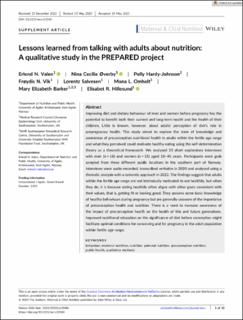| dc.contributor.author | Valen, Erlend Nuland | |
| dc.contributor.author | Øverby, Nina Cecilie | |
| dc.contributor.author | Hardy-Johnson, Polly | |
| dc.contributor.author | Vik, Frøydis Nordgård | |
| dc.contributor.author | Salvesen, Lorentz | |
| dc.contributor.author | Omholt, Mona Linge | |
| dc.contributor.author | Barker, Mary Elizabeth | |
| dc.contributor.author | Hillesund, Elisabet Rudjord | |
| dc.date.accessioned | 2024-02-06T13:40:16Z | |
| dc.date.available | 2024-02-06T13:40:16Z | |
| dc.date.created | 2023-06-23T11:42:35Z | |
| dc.date.issued | 2023 | |
| dc.identifier.citation | Valen, E. N., Øverby, N. C., Hardy-Johnson, P., Vik, F. N., Salvesen, L., Omholt, M. L., Barker, M. E. & Hillesund, E. R. (2023). Lessons learned from talking with adults about nutrition : A qualitative study in the PREPARED project. Maternal & Child Nutrition, 20(S2): e13540. | en_US |
| dc.identifier.issn | 1740-8709 | |
| dc.identifier.uri | https://hdl.handle.net/11250/3115976 | |
| dc.description.abstract | Improving diet and dietary behaviour of men and women before pregnancy has thepotential to benefit both their current and long‐term health and the health of theirchildren. Little is known, however, about adults' perception of diet's role inprepregnancy health. This study aimed to explore the state of knowledge andawareness of preconception nutritional health in adults within the fertile age rangeand what they perceived could motivate healthy eating using the self‐determinationtheory as a theoretical framework. We analysed 33 short exploratory interviewswith men (n= 18) and women (n= 15) aged 18–45 years. Participants were grabsampled from three different public locations in the southern part of Norway.Interviews were audio‐recorded, transcribed verbatim in 2020 and analysed using athematic analysis with a semantic approach in 2022. The findings suggest that adultswithin the fertile age range are not intrinsically motivated to eat healthily, but whenthey do, it is because eating healthily often aligns with other goals consistent withtheir values, that is, getting fit or looking good. They possess some basic knowledgeof healthy behaviours during pregnancy but are generally unaware of the importanceof preconception health and nutrition. There is a need to increase awareness ofthe impact of preconception health on the health of this and future generations.Improved nutritional education on the significance of diet before conception mightfacilitate optimal conditions for conceiving and for pregnancy in the adult populationwithin fertile age range. | en_US |
| dc.language.iso | eng | en_US |
| dc.publisher | Wiley | en_US |
| dc.rights | Attribution-NonCommercial-NoDerivatives 4.0 Internasjonal | * |
| dc.rights.uri | http://creativecommons.org/licenses/by-nc-nd/4.0/deed.no | * |
| dc.title | Lessons learned from talking with adults about nutrition : A qualitative study in the PREPARED project | en_US |
| dc.type | Journal article | en_US |
| dc.type | Peer reviewed | en_US |
| dc.description.version | publishedVersion | en_US |
| dc.rights.holder | © 2023 The Author(s) | en_US |
| dc.subject.nsi | VDP::Medisinske Fag: 700::Helsefag: 800::Ernæring: 811 | en_US |
| dc.source.pagenumber | 10 | en_US |
| dc.source.volume | 20 | en_US |
| dc.source.journal | Maternal & Child Nutrition | en_US |
| dc.source.issue | S2 | en_US |
| dc.identifier.doi | https://doi.org/10.1111/mcn.13540 | |
| dc.identifier.cristin | 2157419 | |
| dc.relation.project | Universitetet i Agder: 689019 | en_US |
| cristin.qualitycode | 1 | |

